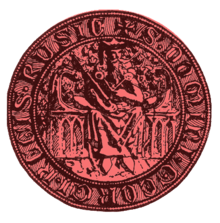Rex Russiae

Rex Russiae ( Latin for King of Rus or Russia , Reussen , Ruthenien ) was a Western European title used in numerous medieval documents and narrative sources referring to Russian rulers of the Rurikid dynasty. It was actively offered to some of them. The only case when this title was adopted was the coronation of Daniel Romanovich of Galicia-Volhynia in Dorogitschin in 1253.
history
The title appeared in papal letters to the princes of the Kievan Rus since the 10th century and reflected the custom of that time to refer to the rulers of independent countries as kings. When a dispute for the throne broke out among the sons of Yaroslav the Wise , Prince Isjaslav I sent his son Yaropolk to Rome , where in 1075 he received a papal bull proclaiming him King of the Rus. After his return, however, the two did not risk publishing the bull in their Russian Orthodox country. The attempt to change the traditional order of succession of the Rurikids in this way failed.
The title of king appeared in Russian political culture in the 13th century when it was conferred simultaneously on two rulers of Eastern Europe: Daniel Romanovich of Galicia-Volhynia and Mindaugas of Lithuania . Daniel was crowned by papal legates in 1253 in the border town of Dorogitschin. With the award of the title of king, Rome pursued the goal of expanding its sphere of influence, but neither Catholicism nor the crusades against the pagans were of importance to the two rulers. Daniel needed military aid against the Mongols, while Mindaugas needed it against the Knights of the Teutonic Order . The Pope could not and did not want to provide this help, which is why the agreements were not implemented and the title became meaningless for all sides. Daniel's sons Lew and Mstislaw no longer allowed themselves to be crowned. An attempt to revive the title was made by Daniel's grandson Juri , who used it on coins and seals, and his descendants also used it. After the conquest of Lvov by the Polish King Casimir III. in 1349, he added the title Regis Russiae to his title. In the course of the 14th century, Russia in the narrower sense was only understood to mean the previous principality of Halitsch , while the principality of Volhynia was referred to as Ladimiria (by Vladimir (now Volodymyr-Wolynskyj ); later also Lodomeria ) and became part of the Grand Duchy of Lithuania . The "Kingdom of Rus" was abolished in 1434 and converted into the Ruthenian Voivodeship .
In 1489, the German diplomat Nikolaus Poppel brought the Moscow Grand Duke Ivan III. , who called himself ruler of the whole of Rus (государь всея Руси), the offer of a royal title from the hands of the Roman-German Emperor Maximilians I. Thereupon Ivan III. the diplomats know that the Rurikids have been rulers of their territories since the ancestors and that their power is by the grace of God. You've never looked for anything else before and you don't plan to do that now. Vasily III subsequently received similar offers of the title of king from the popes or the Roman-German emperors, who saw it as an instrument for integrating Russia into Catholic Europe . and Ivan IV , but they also rejected him. When a false rumor arose in Europe in 1550 that Pope Ivan IV was to award the title of king in return for the common struggle against the Turks, this caused considerable unrest in Poland-Lithuania . Emissaries of King Sigismund II. August urged the Pope to recognize Ivan IV not as King of Russia ( Rex Russiae ), but merely as King of Moscow (Rex Moscoviae), since the title Rex Russiae supposedly already belongs to the Jagiellonians .
literature
- Бойко І. . - 2009. - № 3 (58). - С. 105-114.
- Ісаєвич Я. Д. Королевство Русь (укр.) // Енциклопедія історії України / Редкол .: В. А. Смолій (голова) та ін. НАН України. Інститут історії України .. - К .: Наукова думка, 2008. - Т. 5: Кон — Кю. - С. 568.
- Филюшкин А. И. Титулы русских государей. М .; СПб., 2006. - С. 49-54
- Sieradzki J. Regnum Russiae: polityka ruska Kazimierza Wielkiego (польск.) // Kwartalnik Historyczny. - Warszawa: Państwowy Instytut Wydawniczy, 1958. - T. 65, no. 2. - pp. 497-510.
- Soloviev AV "Reges" et "Regnum Russiae" au Moyen Age (фр.) // Byzantion. - Bruxelles: Fondation Byzantine, 1966. - Vol. 36. - P. 144-173.
- Szyszka J. Problemy ustrojowe i prawne na Rusi Halickiej w granicach Królestwa Polskiego do 1569 roku (польск.) // Czasopismo Prawno-Historyczne. - 2015. - T. 46, no 1. - pp. 417-437.